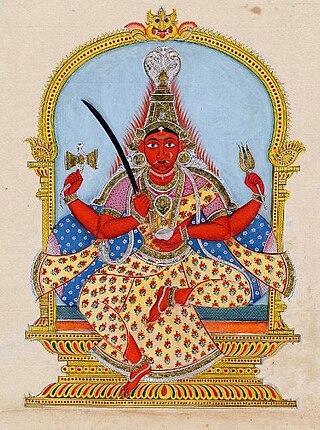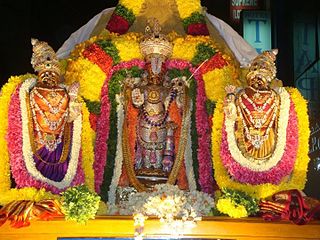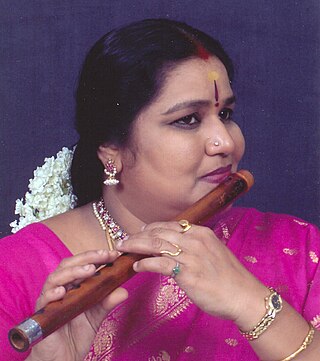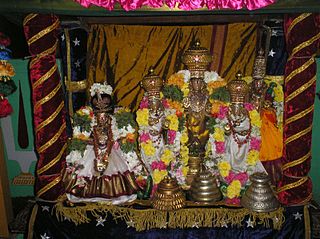Neela is a feminine given name which may refer to:
Tamil may refer to:

Lakshmi, also known as Shri, is one of the principal goddesses in Hinduism, revered as the goddess of wealth, fortune, prosperity, beauty, fertility, royal power and abundance. She along with Parvati and Sarasvati, forms the trinity called the Tridevi.

Mariamman, often abbreviated to Amman, is a Hindu goddess of weather, predominantly venerated in the rural areas of South India. Her festivals are held during the late summer/early autumn season of Ādi throughout Tamil Nadu and the Deccan region, the largest being the Ādi Thiruviḻa. Her worship mainly focuses on bringing rains and curing diseases like cholera, smallpox, and chicken pox. Mariamman is worshipped in accordance with local traditions such as Pidari or the Gramadevatai. She is considered as a guardian deity by many South Indian village-dwellers. She is also the regional form of hindu goddess Parvati. Her consort is lord Shiva. At samayapuram, she is the sister of Ranganathaswamy. She is also worshipped in Karnataka as Marikambe, who is a manifestation of Adi-Parashakti or Mahadevi.

Ranganatha, also known as Ranganathar, Rangan, Aranganathar, SriRanga, and Thenarangathan, is a Hindu deity with his origin in southern India, serving as the chief deity of the Sri Ranganathaswamy Temple, Srirangam. The deity is a resting form of Vishnu, recumbent on the great form of the serpent god Adishesha, the king of the serpents. His primary consort is the goddess Lakshmi, also known as Ranganayaki. The two other consorts seen next to his recumbent figure are Bhudevi and Nila Devi. Most of the deities portray a 'smiling' lord in a sleeping or reclining position over the celestial serpent Adishesha in the sea of cosmic dissolution (pralaya). This is the form in which he is open to listening to all of his devotees' woes, and blesses them. Apart from being worshipped by all Hindus, this form is of particular importance to the Sri Vaishnava community. His name in Sanskrit means "leader of the place of assembly", coined from the two Sanskrit words ranga (place) and natha.
Raja is an Indian term for a monarch, or princely ruler.

Perumal or Tirumal is a Hindu deity. Perumal is worshipped mainly among Tamil Hindus in South India and the Tamil diaspora, who consider Perumal to be a form of Vishnu.

Natesan Ramani, commonly known as N. Ramani or N. Flute Ramani, was an Indian Carnatic flautist. He was awarded the Madras Music Academy's Sangeetha Kalanidhi in 1996. Ramani is also credited with introducing the long flute into Carnatic music.

Sikkil Mala Chandrasekhar is a noted South Indian carnatic flautist. Mala Chandrasekhar was born to a musical family.
Sikkil Kunjumani and Sikkil Neela were sisters who played the carnatic flute, called Venu flute. Together they are more famously known as the Sikkil Sisters. Their father Azhiyur Natesa Iyer was a mridangist. Kunjumani started learning music from her father initially and then learnt flute from her maternal uncle Azhiyur Narayanaswami Iyer. Neela learnt flute from her sister Kunjamani. Kunjamani, began giving concerts from the age of nine and Neela from the age of seven. Sikkil Sisters have been giving concerts together since 1962. They are top artistes of the All India Radio and they have been giving hundreds of performances at all the sabhas, television and elsewhere, both within India and abroad. The sisters blend the tone and play on their flutes and the merger is total and the effect remarkable. They are known for the chaste, orthodox style in rendering raga, kriti and swara.
Gajabahu I, also known as Gajabahuka Gamani, was a Sinhalese king of Rajarata in Sri Lanka. He is renowned for his military prowess, religious benefactions, extensive involvement in South Indian politics, and for possibly introducing the cult of the goddess Pattini to Sri Lanka. The primary source for his reign is the Mahavamsa, though he is also the only early Sri Lankan king to be extensively mentioned in the Chera Cilappatikaram.
Kanagasabai is a Tamil male given name. Due to the Tamil tradition of using patronymic surnames it may also be a surname for males and females.
Nila may refer to:
Siva may refer to:
Gayatri is the feminine form of gāyatra, a Sanskrit word for a song or a hymn. It may also refer to:
Neelam or Neelum may refer to:
Ranjit or Renjith may refer to:
Neela is a feminine given name

Niladevi, also rendered as Neela Devi or Nappinnai, is a Hindu goddess, and a consort of the preserver deity Vishnu, along with Sridevi and Bhudevi. Niladevi is primarily revered in South India, particularly in Tamil culture, as one of Vishnu's consorts. In Sri Vaishnava tradition, all three consorts of Vishnu are regarded as aspects of Mahalakshmi.
Ponnambalam or Ponnampalam is a Tamil male given name. Due to the Tamil tradition of using patronymic surnames it may also be a surname for males and females.
Sikkil is an Indian unisex given name that may refer to